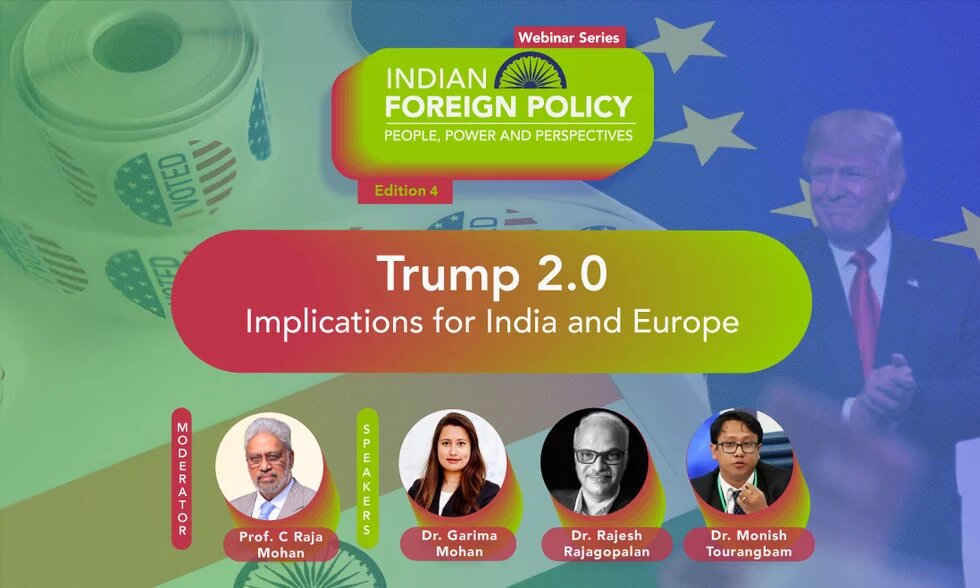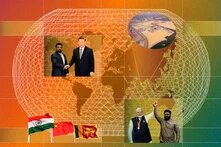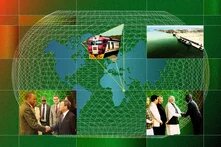Summary Report
This webinar explored the foreign policy implications of Donald Trump’s victory at the 2024 US presidential election from an Indian perspective, but also including of what this means for Europe and the Indo-European relationship.

- Donald Trump’s second Presidency is set to shake up US governance at home and its role on the global stage. His transactional and unpredictable leadership style is likely to disrupt traditional alliances and pose challenges to multilateral frameworks, forcing allies and partners to adapt and redefine global cooperation and security.
- Trump’s policies exhibit some notable continuities with Obama’s, particularly in their shared emphasis on reducing US involvement in costly foreign conflicts. Both administrations prioritized resource-efficient leadership, with Obama advocating for avoiding "stupid wars" and Trump focusing on cutting overseas commitments. A bipartisan consensus on addressing China’s rise also connects their strategies, though Trump’s approach has been more confrontational.
- India perceives a second Trump term as a mixed bag, finding alignment with the US on critical issues like countering China’s assertiveness in the Indo-Pacific and supporting legal immigration, particularly in the fields of science, technology, engineering, and mathematics (STEM), which benefits its skilled workforce.
- While the above areas of convergence are positive, India will remain cautious about over-reliance on the US and aim to balance its relationships with other global powers. Trade challenges persist, with the need to address imbalances and disputes from Trump’s first term, such as around tariffs. The transactional nature of Trump’s diplomacy may require India to adopt a more pragmatic and calculated approach in negotiations.
- The US will continue to view India as central to countering China’s influence in the Indo-Pacific and integrating it into a regional security framework is a strategic priority. However, India’s cautious stance and reluctance to fully commit to security collaborations within the Quadrilateral Security Dialogue (Quad), a strategic partnership between the United States, India, Japan and Australia, have led to skepticism about its effectiveness. While India’s military confrontation with China is acknowledged as significant, it is seen as driven more by necessity than Quad obligations. Continued cautious engagement by India, coupled with the perception of the Quad as becoming a "talk shop" could test the Trump administration’s patience, as it will push for a more confrontational approach.
- Trump’s perceived softness toward Putin, combined with his transactional approach, raises concerns about how a second term will affect Russia’s war against Ukraine. Speculation suggests that in the interest of a swift conclusion to the war he may seek a deal favoring Russia, potentially compromising Ukraine’s sovereignty and NATO’s strategic interests.
- Trump’s criticism of NATO allies for insufficient defense spending highlights Europe’s reliance on US security, a dependency underscored by the Russia-Ukraine war. Despite growing discussions on reducing US reliance, Europe struggles to unify defense policies and bolster collective security, leaving it vulnerable amid shifting geopolitics.
- Europe’s commitment to globalization and regional integration is at odds with Trump’s protectionist policies, including trade wars and tariffs. The US push for technological decoupling from China adds complexity, as Europe struggles to balance its economic ties with China while meeting US security demands. Despite Trump’s pressure for Europe to align on issues like 5G security and Huawei, Europe remains hesitant to fully decouple, fearing economic consequences and over-reliance on US leadership.
- Europe and India have an opportunity to deepen collaboration amid debates over a more isolationist US. The incoming EU Commission President, Ursula von der Leyen, has prioritized strengthening the India-EU relationship, especially through the Trade and Technology Council. By focusing on areas like green technology and energy (areas that can observe possible US retrenchment under Trump) both regions can build resilience against shifting US policies and foster a more robust, independent partnership.
The views and analysis contained in this summary are those of the speakers and do not necessarily represent the views of the event organisers.


